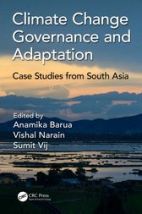Climate Change Governance and Adaptation: Case Studies from South Asia

Climate Change Governance and Adaptation explores the dynamic interactions between governance and climate change. The focus is broadened beyond the state to the various actors – the state, markets, civil society and communities – involved in responses to climate change through eight South Asian case studies. Drawing from contributions from Northern and Southern researchers, as well as academic and practitioner communities spanning various social science disciplines, the book considers a variety of agro-ecological and institutional contexts, defining the frontiers of and demonstrating the need for a research agenda on climate change adaptation in the region.
The book’s eight case studies are organized according to three broad themes. The first section deals with “Climate Change Governance and Societal Challenges in South Asia”. These chapters emphasize the importance of incorporating social equity, environmental justice and local perceptions into effective climate change governance. One of the case studies in this section (Chapter 2 by Georgina Drew) explores local perceptions of the River Ganga’s dynamics of change in the Garhwal region, arguing for the need to craft people-centred and culturally appropriate climate change governance measures.
The second section, on “Adaptation to Climate Change-Induced Impacts through Effective Governance”, explores the factors that shape community responses to climate change, and the role of social capital and education in enhancing adaptive capacity. Chapters within this section challenge conventional mainstream narratives. For instance, Chapter 5 challenges the global narrative of the overly simplistic causal relation between climate change and migration by tracing the experience of Bangladesh, arguing that a more realistic and prudent outlook is required to inform migration governance. In this chapter, Arabinda Mishra draws on five illustrative case studies from the Hindu Kush Himalaya region to argue that multiple forces interact to affect not only the erosion of social capital in the communities, but also its emergence and transformation, and that this has implications for planning adaptation interventions.
Lastly, the book’s third section, on “Climate Change Governance at National and Regional Levels”, considers challenges to developing policies and programmes, investigating how to engender successful solutions and management pathways towards climate change adaptation. Chapters within this section outline the need for further research and methodological techniques to inform effective governance. Chapter 8 highlights the need for research on how to integrate the political, scientific, economic, social and institutional realities into climate change governance. In Chapter 9, Navarun Varma and Sanjoy Hazarika argue that transdisciplinary praxis offers a robust yet flexible methodology that can facilitate the shared understanding and co-design of solutions to transboundary issues in a region characterized by mistrust.
Book note prepared by Kate Goh
Search the Book notes database
Our Book notes database contains details and summaries of all the publications included in Book notes since 1993 - with details on how to obtain/download.
Use the search form above, or visit the Book notes landing page for more options and latest content.
For a searchable database for papers in Environment and Urbanization, go to http://eau.sagepub.com/

